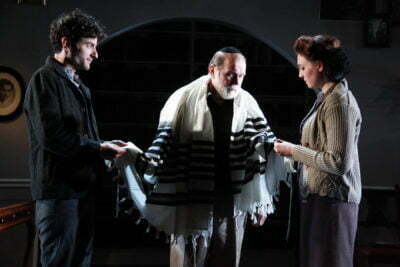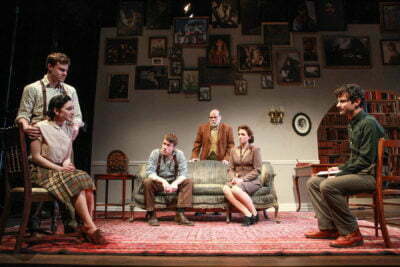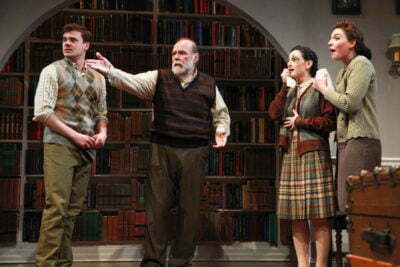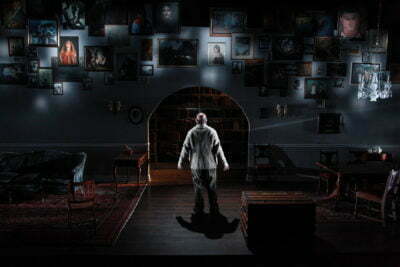A Splintered Soul
By Alan Lester Brooks
Directed by Keira Fromm
Produced by ARLA Productions
At Stage 773, Chicago
Devastating Drama Examines What People Need to Survive
Last year, Theater Wit’s production of Bad Jews was the smash hit of the season, running for several months and transferring between several high-profile venues. Clearly, it struck a nerve with Jewish audiences by examining the legacy Holocaust survivors leave for the last generation that will know them personally. It was also a welcome break from the usual Holocaust plays, which, while important for an entry-level understanding of events and deservingly respected, usually require their protagonists to be passive and ignorant to the point where it is easy to become alienated from them. But now, at Stage 773, Chicago theatregoers have a chance to see the Midwest premiere of Alan Lester Brooks’s A Splintered Soul, a psychological drama which examines what became of the survivors during the first years after they regained their freedom. This play, too, frankly exposes the fault lines in the Jewish community, but what is most remarkable about it, besides Keira Fromm’s skillful production, is its probing of what it means to be a survivor.

Rabbi Simon Kroeller (Craig Spidle) was a resistance fighter in Poland who lost his entire family. Now, in 1947, he lives in San Francisco, where he has no congregation, but is the informal leader of the other survivors. His friend and frequent liaison to the American Jewish community is Martin Levinsky (Dev Kennedy), a judge and firm believer in American liberalism. The men enjoy debating, but the judge isn’t convinced that the rabbi’s group therapy sessions are not really a front for organizing Zionist militants. It’s not, but Simon isn’t so sure he’s against the idea. Next time, he vows, the Jews will be prepared, and they won’t depend on grudging pity from American cousins, or help that never came when it was most needed. To Martin, it sounds like Simon is determined to create a “next time” just so he can have the satisfaction of winning.

The American Jews sponsored the refugees (to become menial laborers), and opened their homes to them (as servants), but the refugees’ un-American ideas and trauma-induced unhealthy behavior is wearing on their hosts’ nerves. Simon acquiesces to allowing Martin to observe one of his sessions, so he can see whether the members are really good for each other. The other members are not pleased about having to disclose what they did to survive to a literal judge, nor about explaining their embarrassing current situations. Mordechai (Nik Kourtis) is a chipper baker’s assistant who wants to get married, but his intended’s father disapproves of his prospects, and there’s another complication which he only admits in strictest confidence. Gerta (Eliza Stoughton) is swallowing her pride by working as a maid in a home where she’s obviously the cause of marital discord, and Sol (Matt Mueller), a skilled craftsman, openly resents being employed making canvas frames. There are also two new arrivals Simon wishes to keep secret from Martin because they’re in the country illegally. Elisa (Jessica Kingsdale) and her brother, Harold (Curtis Edward Jackson), were smuggled into Switzerland and then the United States by a Polish count, but had arrest warrants issued against them in Europe for assisting in his illegal activities, and were sexually abused by him. In them, Simon sees a chance to get back into the fight.

The playing space represents a few houses, but is, for the most part, a clever representation of Simon’s mind. Scenic and lighting designer Brian Sidney Bembridge has covered the entire back wall with paintings of pre-World War II Jewish life in Europe, and at the top of the play, Simon adds a photograph of his wife, whose voice (Johanna McKenzie Miller) he still hears. Craig Spidle’s performance is complex, proud, and tormented, as are those of all the actors. Rabbi Simon not only refuses to “let go” of the past, which Martin defines for him as forgetting it, he also cannot exist without his role as the Jews’ defender. Stoughton, too, plays a woman who disdains the condescension implicit in pity, but she’s determined to move on with her life, and doesn’t care if that means wrecking someone else’s home. Simon, ever the supportive mentor, assures her that she is justified in whatever she wants, but a major influence on him when he says this is the cynical, abrasive Sol. Having survived the camps by constructing the gas chamber doors, Sol makes no apologies for his amorality. When Martin challenges him on how he would feel had his own family perished in the ovens, Sol snaps that they did. Mueller’s performance is chilling, but his character is not the only one who is revealed to have a past like that. The group understands that, though they’re constantly advised not to blame themselves and that they won’t be judged for how they cope, outsiders are still find them disturbing.

The story is mostly driven by Simon’s attempts to protect the other refugees, especially Elisa and Harold, regardless of what anyone else tells him is smart or right. However, the plays is mostly a character study. The problem with dedicating your life to revenge is that it requires there to always be someone to take revenge upon. Simon hears and sees what he wants to, justifies everything, and uses the Holocaust as his framework for understanding every situation he comes across. Of course, the result is not good, but he sincerely inquired about the philosophy of justice from his biggest critics, and tried to do what was right for the people who had been betrayed by everyone else. Director Keira Fromm has done a magnificent job of placing the fallout of a historic catastrophe within scenes from plausible peoples’ lives. Remembering the past doesn’t just mean when it’s convenient, and A Splintered Soul honestly grapples with some of the darkest and most painful legacies of the modern world. It’s tragedy at its finest.
Highly Recommended
Jacob Davis
Reviewed April 23, 2016
This show has been Jeff recommended.
For more information, see A Splintered Soul’s page on Theatre in Chicago.
Playing at Stage 773, 1225 W Belmont Ave, Chicago. Tickets are $36, with discounts for seniors and students; to order, call 773-327-5252 or visit stage773.com. Performances are Thursdays and Fridays at 7:30 pm, Saturdays at 3:00 pm and 8:00 pm, and Sundays at 3:00 pm through May 29. Running time is two hours and fifteen minutes with one intermission.

